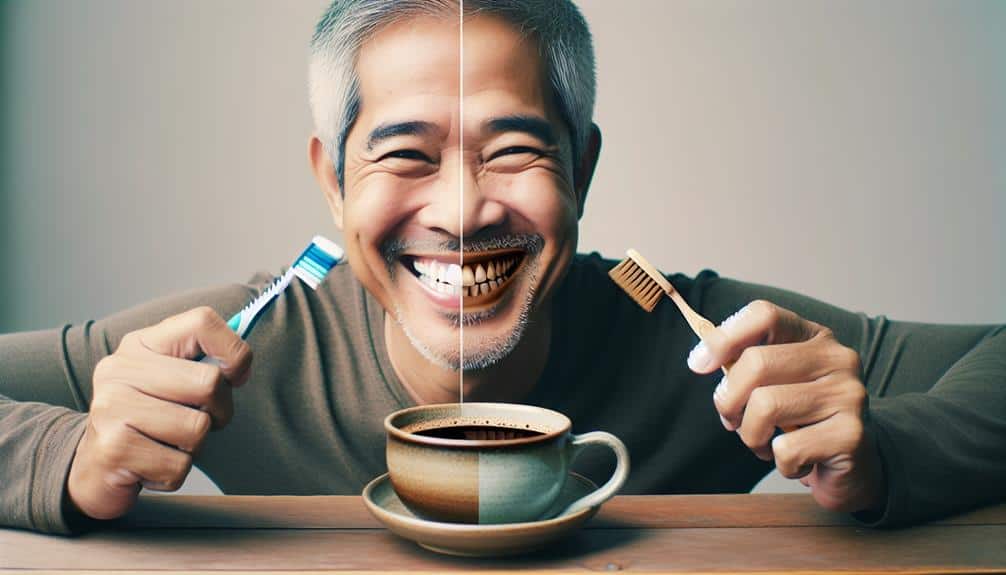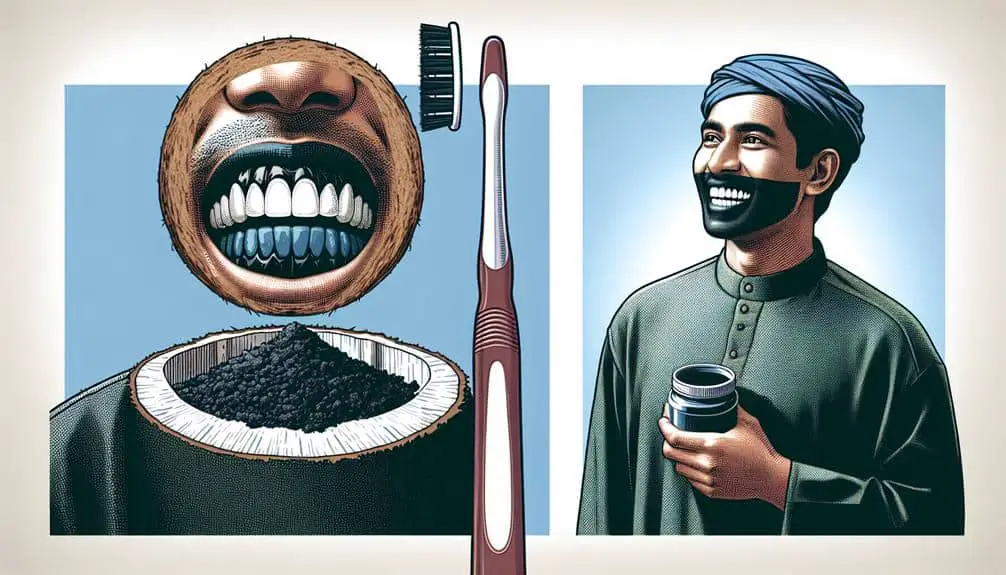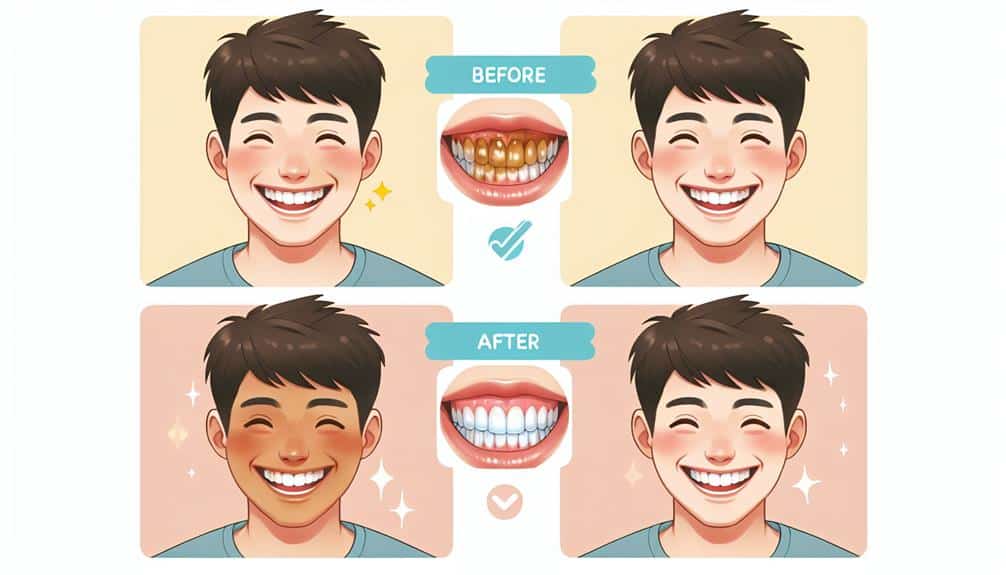To prevent coffee stains on your teeth, maintain good dental hygiene. Use whitening toothpaste containing hydrogen peroxide or baking soda. Brush at least twice daily, focusing on the gum line and between teeth. Employ a soft-bristled brush with gentle, circular motions. Don't forget to floss daily, removing debris and preventing stains. Mouthwash with whitening properties can help rinse away coffee residues. Regular professional cleanings can reach missed areas and detect early damage. Healthy dietary habits also play a role in enamel protection. Prioritize consistent oral care habits for effective stain prevention.
Key Points
- Brushing techniques remove surface coffee stains effectively.
- Flossing daily prevents coffee stains between teeth.
- Mouthwash rinses away coffee residues to prevent discoloration.
- Professional cleanings eliminate surface stains and protect enamel.
- Dietary habits like high-fiber foods aid in preventing coffee stains.
Brushing Techniques for Coffee Stain Prevention
To prevent coffee stains on your teeth, employing proper brushing techniques is essential for maintaining good dental hygiene. Due to coffee consumption, your teeth are exposed to pigments that can cause discoloration over time. When selecting toothpaste, opt for whitening formulas that contain ingredients like hydrogen peroxide or baking soda, as these can help remove surface stains caused by coffee.
It's vital to brush your teeth at least twice a day, especially after consuming coffee, to prevent the pigments from settling and causing stains. Make sure you're using a soft-bristled toothbrush and gentle, circular motions to clean all surfaces of your teeth effectively. Pay extra attention to areas where stains commonly occur, such as along the gum line and between teeth.
Importance of Flossing for Stain Control
Flossing regularly plays a significant role in controlling and preventing coffee stains on teeth by effectively removing plaque and debris between teeth where stains can easily accumulate. To guarantee excellent stain control, follow these key flossing practices:
- Proper Technique: Use a gentle back-and-forth motion to guide the floss between your teeth. Curve the floss around each tooth in a C shape and slide it under the gumline to dislodge any trapped debris.
- Daily Routine: Make flossing a part of your daily oral hygiene routine. Ideally, floss at least once a day, preferably before bedtime, to remove any food particles and plaque buildup that could lead to staining.
- Consistency is Key: Consistent flossing not only helps in preventing coffee stains but also contributes to overall oral health by reducing the risk of gum disease and cavities. Stick to your flossing routine for a brighter, stain-free smile.
Role of Mouthwash in Stain Prevention
Mouthwash serves as a valuable adjunct in preventing stains on your teeth caused by coffee consumption. While mouthwash can be effective in reducing the buildup of stains, its effectiveness may vary depending on the type of mouthwash and individual factors.
Mouthwash can help by rinsing away coffee residues that may lead to discoloration, but it's important to understand its limitations. Mouthwashes with whitening properties can provide additional benefits in preventing and reducing stains.
When using mouthwash for stain prevention, it's important to follow proper techniques. Make sure you swish the mouthwash around your mouth for the recommended time to allow it to reach all areas.
However, it's important to mention that mouthwash alone may not entirely prevent coffee stains, especially if not used in conjunction with other dental hygiene practices like regular brushing and professional cleanings. Remember, consistency in oral hygiene routines is key to effectively combatting coffee stains on your teeth.
Professional Cleanings and Stain Removal
Professional dental cleanings by a hygienist or dentist are essential for effectively removing stubborn coffee stains from your teeth. These cleanings involve the use of specialized tools and techniques to eliminate surface stains and prevent deeper discoloration. Here are some key points to keep in mind:
- Thorough Cleaning: Professional cleanings can reach areas that regular brushing and flossing may miss, ensuring that all coffee stains are addressed.
- Early Detection: During these cleanings, dentists can identify any signs of enamel erosion or damage caused by coffee stains. Early detection allows for prompt intervention to prevent further staining and protect the enamel.
- Preventive Measures: Besides removing existing stains, dental professionals can recommend whitening treatments to enhance the whiteness of your teeth and provide enamel protection to safeguard against future staining.
Dietary Habits for Stain-Free Teeth
To maintain stain-free teeth, consider incorporating dietary habits that promote oral health and minimize the risk of discoloration caused by coffee and other staining agents. Certain foods can aid in enamel protection and natural teeth whitening. Foods high in fiber like apples, carrots, and celery can help scrub away surface stains and stimulate saliva production, which aids in washing away food particles and reducing acidity in the mouth.
Additionally, dairy products such as cheese and yogurt contain calcium and phosphates that strengthen enamel and help remineralize teeth, making them more resistant to stains. Drinking plenty of water is also important for hydration and saliva production, which play a critical role in maintaining a healthy oral environment.
Frequently Asked Questions
How Often Should I See My Dentist for Professional Cleanings to Prevent Coffee Stains on My Teeth?
To keep your smile bright and coffee stain-free, make sure you schedule regular dental checkups every six months. Timing matters too; after enjoying coffee, brush or rinse to minimize staining. Consistent care makes a noticeable difference.
Are There Any Specific Toothpaste or Toothbrush Recommendations for Maintaining White Teeth and Preventing Coffee Stains?
When selecting toothpaste for maintaining white teeth and preventing coffee stains, look for options with whitening properties like hydrogen peroxide or baking soda. Brush gently in circular motions twice daily to effectively remove surface stains.
Can Certain Medications or Medical Conditions Contribute to Coffee Stains on Teeth, and if So, How Can They Be Managed?
Certain medications and medical conditions can impact coffee stains on teeth. To manage medication impacts, consult your healthcare provider for alternative options. Prevention strategies for medical conditions may include regular dental check-ups and professional cleanings to minimize staining effects.
Are There Any Natural Remedies or DIY Solutions That Can Help Prevent Coffee Stains on Teeth in Addition to Regular Dental Hygiene Practices?
Feeling the allure of natural remedies and DIY solutions for coffee stains on teeth? Explore herbal alternatives and prevention techniques to complement your dental hygiene routine. Discover home remedies that may help maintain your bright smile.
Is There a Specific Timeframe After Consuming Coffee When It Is Most Crucial to Brush and Maintain Oral Hygiene to Prevent Staining?
To prevent coffee stains on teeth, after drinking, brush with a fluoride toothpaste using gentle circular motions. Timing matters; aim to brush within 30 minutes. Incorporate mouthwash and flossing in your routine for thorough cleaning. Consistency is key.



